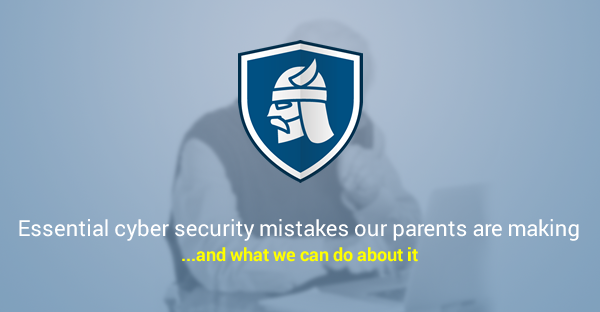Heimdal Online Security: 10 Ways to Help Our Parents With Online Security

My parents are bright, intelligent people, curious to explore how modern stuff works. They quickly adopted all kind of new technologies into their lifestyle. They have more than 20 years of experience working on PCs, they own top of the line smartphones and smart TVs. They started using Facebook, Twitter and Instagram than most of my (same-age) friends. They aren’t scared of ordering stuff online, or using services like Uber and AirBnB.
However, when it comes to privacy and security they have huge gaps.
They are aware that the digital world has its risks, but they can be easily deceived. It’s difficult for them to realize how close they are to losing money or sensitive data.
They can’t tell the difference between important and optional security steps. They also can’t distinguish between essential information and one that only has a commercial purpose.
And I completely get it: with the avalanche of existent information, I often feel overwhelmed myself.
My guess would be that your parents fall under the same vulnerable category. It’s important that we help them understand the basics of online security and create healthy digital habits.

Our parents have poor basic security habits
1.They think they have nothing worth the cybercrooks’ interest.
No? Really? What about any work documents? No contracts attached to past emails? Any information they wouldn’t want to be public? No credit cards pins saved in text drafts on desktop? No online shopping on websites that stored credit card details?
How you can help:
Open their eyes. Compile together a list of all their online information assets. Take every account they have: emails (both work and personal), social network profiles, financial accounts, etc.
List everything they have on those accounts, from work documents, photos, personal messages or sensitive information, such as credit cards PINs, passwords or social security number.
Ask them to imagine how much it would cost if they lost that information, was deleted, stolen or leaked online. According to this, have them note how valuable each information is.
You can also have them follow our free, action-ready security plan.
2.They have bad passwords habits.
They set passwords that are easy to guess – it’s usually their kids’ names, birth dates or pets’ names. Most likely, this kind of information can be found on social networks, such as Facebook profiles, where they are willingly sharing it. This makes cyber criminals’ jobs easier: they only need to glance over the social accounts profiles to find out possible passwords combinations or answers to security questions.
They use the same password everywhere. They don’t take their time to create different passwords for each and every account; they only recycle the same password. And they don’t even think about changing it every few months.
They write their passwords and PIN codes on a paper that they keep in their office desk or in a mail draft. Or worse, in their wallet, next to their credit / debit cards.
By using this site you agree to this Privacy Policy. Learn how to clear cookies here
MATCHDAY - Debreceni EAC vs Pecsi MFC Waszczykowski nie jest już ministrem spraw zagranicznych 토토사이트 Oukacha Duchel Just Won't Go to Sleep and She is Driving Me Crazy! Oukacha Munnich: A Superhero with a Very Special Power Oukacha Jagutkin: The Enigma Unraveled Hawkfield Gallery Fine Arts Consultants - Our Services Organising And Securing Your Files With The Help Of Data Classification Oakmere Road: Top scams for college students to avoid